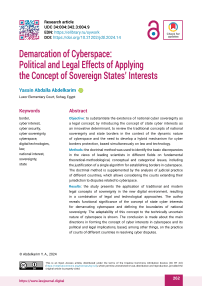Demarcation of Cyberspace: Political and Legal Effects of Applying the Concept of Sovereign States’ Interests
Автор: Abdelkarim Y. A.
Журнал: Journal of Digital Technologies and Law @lawjournal-digital
Статья в выпуске: 2 (2), 2024 года.
Бесплатный доступ
Objective: to substantiate the existence of national cyber sovereignty as a legal concept; by introducing the concept of state cyber interests as an innovative determinant, to review the traditional concepts of national sovereignty and state borders in the context of the dynamic nature of cyberspace and the need to develop a hybrid mechanism for cyber borders protection, based simultaneously on law and technology. Methods: the doctrinal method was used to identify the basic discrepancies in the views of leading scientists in different fields on fundamental theoretical-methodological, conceptual and categorical issues, including the justification of a single algorithm for establishing borders in cyberspace. The doctrinal method is supplemented by the analysis of judicial practice of different countries, which allows considering the courts extending their jurisdiction to disputes related to cyberspace. Results: the study presents the application of traditional and modern legal concepts of sovereignty in the new digital environment, resulting in a combination of legal and technological approaches. The author reveals functional significance of the concept of state cyber interests for demarcating cyberspace and defining the boundaries of national sovereignty. The adaptability of this concept to the technically uncertain nature of cyberspace is shown. The conclusion is made about the main directions in forming the concept of cyber interests in cyberspace and its political and legal implications, based, among other things, on the practice of courts of different countries in resolving cyber disputes. Scientific novelty: the concept of state cyber interests is considered as an innovative method of defining cyber borders. It leads to the transformation of the traditional sovereignty concept and the close national interest concept in relation to cyberspace in the context of fulfilling security requirements and intensifying national defense against cyber threats. Practical significance: the obtained results eliminate existing contradictions in the definition of sovereignty and its spatial limits under the modern technology development; contribute to the elaboration of a disciplinary standard of cyber sovereignty based on a reliable demarcator necessary for the definition of state sovereignty and borders in cyberspace; adapt traditional legal concepts of sovereignty and national interests to the global modern cyber challenges; contribute to the transformation of traditional legal concepts of sovereignty and national interests in cyberspace.
Border, cyber interest, cyber security, cyber sovereignty, cyberspace, digital technologies, law, national interest, sovereignty, state
Короткий адрес: https://sciup.org/14129996
IDR: 14129996 | УДК: 34:004:342.3:004.9 | DOI: 10.21202/jdtl.2024.14


